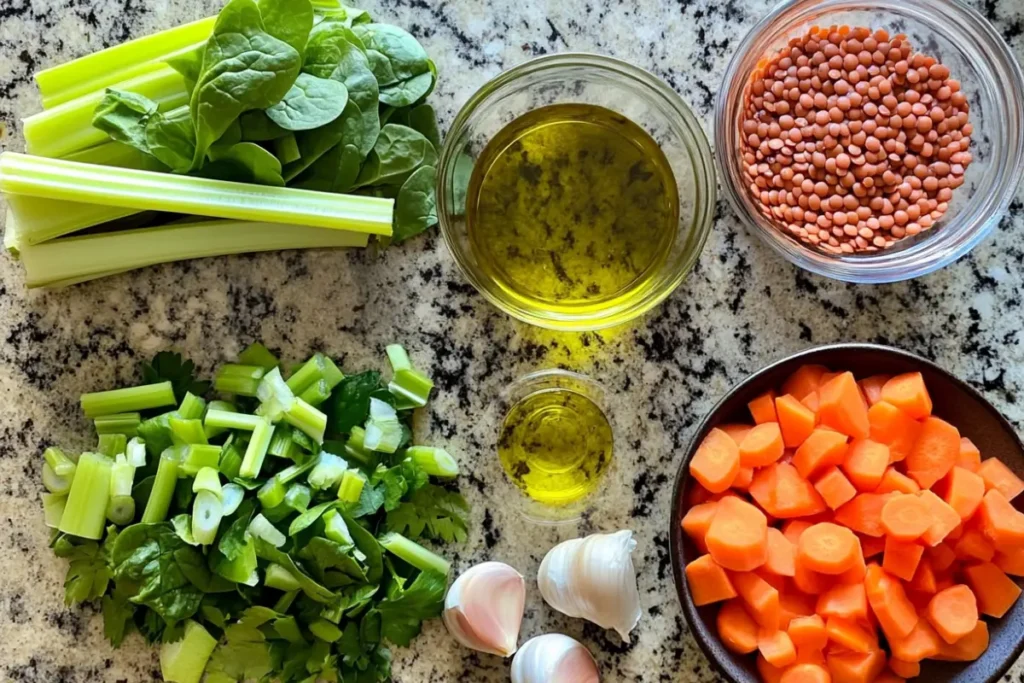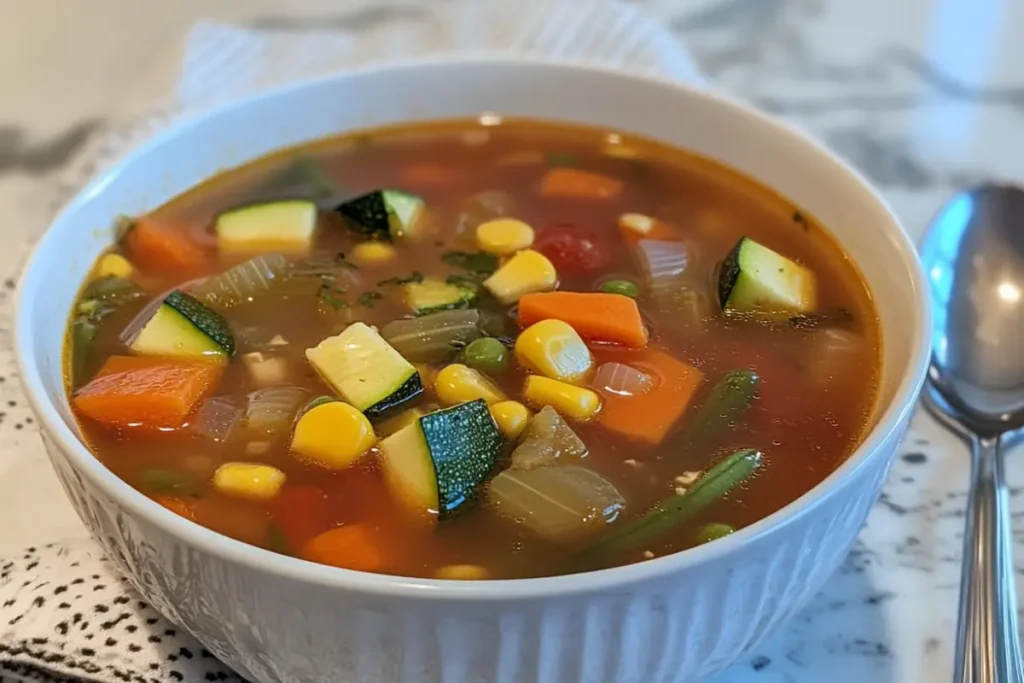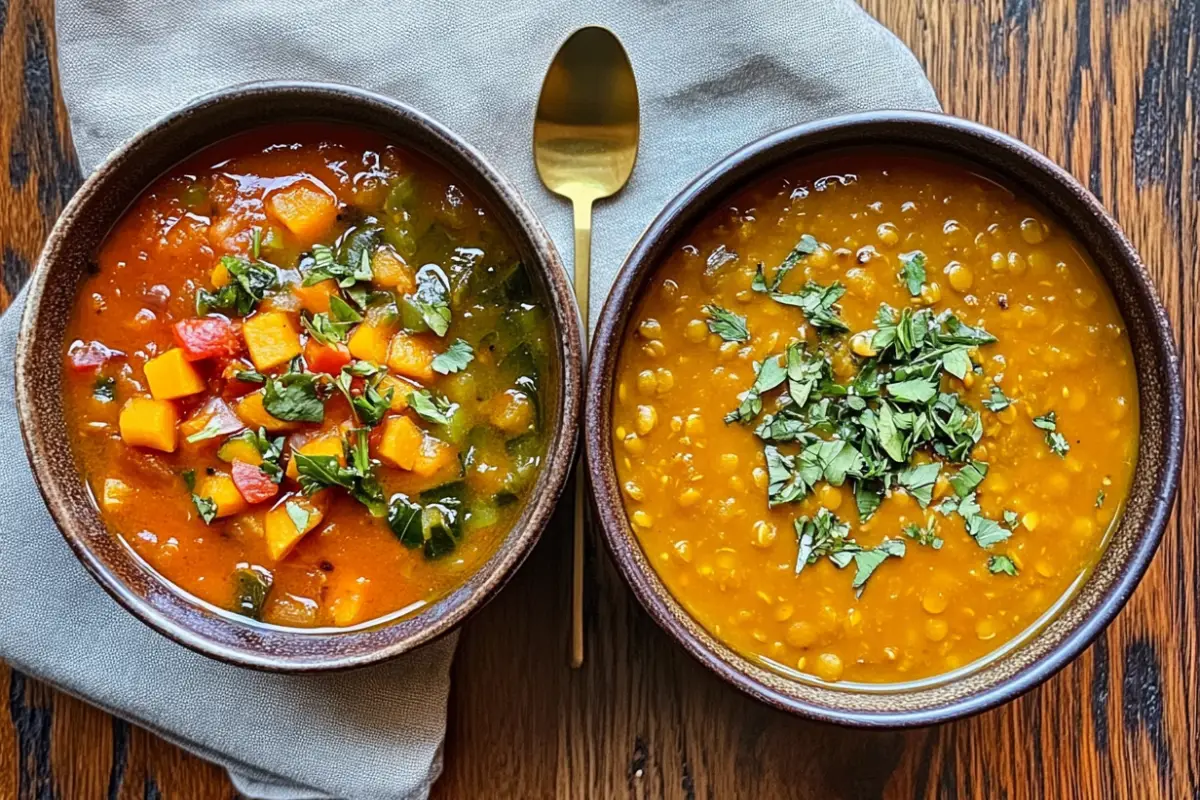Last Updated on March 25, 2025 by Souhail
Imagine curling up with a warm, comforting bowl of soup every day—a dish that not only tastes incredible but also nourishes your body. When we think about the best soup to eat every day, it’s more than just a recipe; it’s a wholesome habit that promotes good health, satisfies your palate, and saves time in the kitchen.
So, what qualifies as the best soup to enjoy daily? It needs to be nutritious, versatile, and easy to prepare. Whether you’re looking to boost your immunity, support weight management, or simply enjoy a comforting meal, the best soup can be tailored to meet your needs. In this article, we’ll explore what makes a soup perfect for daily consumption, discuss its health benefits, and share tips to prepare and customize it to your liking.
From hearty vegetable broths to creamy lentil soups, the possibilities are endless. Stick with me as I dive deep into this warm, delicious topic and help you find the perfect soup to add to your daily menu.
Table of contents
What Makes a Soup Good for Daily Consumption?
Balanced Nutrition:
A great daily soup should include a mix of protein, healthy fats, and fiber. Soups made with lentils, beans, or lean proteins like chicken provide sustained energy and support muscle health. Vegetables such as spinach, carrots, and tomatoes offer essential vitamins and antioxidants.
Customizability:
Soups should be easy to adapt based on available ingredients or dietary preferences. For example, a simple vegetable soup can be made vegan, gluten-free, or low-carb, depending on what you add or omit.
Ease of Preparation:
Daily soups should be easy to make in large batches and store well. Options like broth-based soups, lentil soups, or miso soups are quick to prepare and reheat beautifully.
Which Soups are the Best to Eat Everyday?
Vegetable Soup
Packed with low-calorie, nutrient-dense vegetables, the best soup to eat every day is one that supports your health effortlessly. Use a mix of seasonal vegetables, garlic, and herbs for an easy, customizable option that’s both nutritious and delicious.
Chicken and Vegetable Soup
This classic is a go-to for protein lovers. The lean protein from chicken pairs well with hearty vegetables, providing satiety and nutrients like B vitamins.
Lentil Soup
Lentils are a powerhouse of plant-based protein, fiber, and iron. A lentil soup is filling, heart-healthy, and suitable for many diets, including vegetarian and vegan.
Miso Soup
Miso soup contains fermented miso paste, a great source of probiotics. Add tofu, seaweed, and green onions for a nutritious, light soup.
Bone Broth-Based Soups
Bone broth is rich in collagen, amino acids, and minerals. Use it as a base for various soups or sip it plain for a gut-friendly, warming option.
Why Should You Consider Eating Soup Every Day?
- Weight Management:
Soups are low-calorie yet filling, making them an excellent choice for managing portion sizes and reducing calorie intake. - Hydration and Digestion:
Soups are water-rich and can help maintain hydration levels while aiding digestion due to their soft texture and fiber content. - Immune Support:
Ingredients like garlic, ginger, and turmeric (often used in soups) have immune-boosting properties, making daily soup consumption a natural way to stay healthy. - Budget-Friendly:
Soups can be made in large batches with affordable ingredients, reducing food waste and saving money.
Benefits of Eating Soup Every Day

Eating the best soup to eat every day isn’t just comforting—it’s a powerful way to support your overall health. Here are some key benefits:
Nutritional Boost
Soups are an easy way to pack a variety of nutrients into one meal. Whether it’s vitamins from fresh vegetables, protein from legumes, or healthy fats from olive oil, soups can provide a balanced nutrient profile. For instance, adding spinach to your soup gives you iron and folate, while carrots contribute beta-carotene, a powerful antioxidant.
Digestive Health
Soups are easy to digest because their ingredients are cooked and softened, making them gentle on the stomach. Ingredients like garlic, onions, and ginger further promote gut health by feeding beneficial bacteria or reducing inflammation in the digestive tract.
Hydration
Because soups are water-based, they contribute to daily hydration levels. Staying hydrated is essential for healthy skin, energy levels, and overall bodily functions. Choosing the best soup to eat every day, such as one with a clear broth or water-rich vegetables like zucchini and celery, ensures you’re getting both hydration and essential nutrients naturally.
Weight Management
Soups are naturally filling due to their high water and fiber content, making them an excellent option for those managing their weight. Broth-based soups with lean proteins and non-starchy vegetables can help control calorie intake without sacrificing satisfaction.
Immune Support
Certain soup ingredients are packed with immunity-boosting properties. Garlic, ginger, and turmeric, for example, contain antimicrobial and anti-inflammatory compounds that help your body fight off illness. That’s why chicken soup has long been a go-to remedy for colds!
Budget-Friendly and Sustainable
Soups are economical and reduce food waste. Leftover vegetables, bones, or pantry staples like lentils can easily be transformed into a delicious soup, making it a sustainable choice for households.
Seasonal Soup Recommendations
Eating the best soup to eat every day doesn’t have to be repetitive, especially if you rotate your choices based on the season. Seasonal soups not only taste fresher but also make the most of in-season ingredients, adding variety and flavor to your daily meals.
Winter

In cold months, hearty and warming soups are perfect. Think:
- Butternut Squash Soup: Creamy, spiced, and comforting.
- Beef Stew: Packed with root vegetables and tender meat.
- Chicken Noodle Soup: A classic remedy for chilly days.
Spring
Celebrate spring’s fresh produce with lighter, herby soups:
- Asparagus and Pea Soup: Bright green, creamy, and refreshing.
- Lemon Chicken Orzo Soup: Zesty with a burst of seasonal flavors.
Summer
Stay cool with chilled soups or brothy bowls that don’t feel heavy:
- Gazpacho: A cold Spanish tomato soup, perfect for hot days.
- Cucumber and Yogurt Soup: Light, tangy, and hydrating.
Fall
As autumn rolls in, it’s all about warm, earthy flavors:
- Pumpkin Soup: Silky smooth and full of seasonal spices.
- Mushroom Barley Soup: Hearty and comforting, perfect for cooler weather.
How to Choose the Right Soup for Your Diet

Finding the best soup to eat every day depends on your dietary preferences or goals. Here’s a guide to selecting the right soup:
For Weight Loss
If your goal is weight management, choose soups that are low in calories but high in fiber and protein to keep you full longer.
- Best Choices: Broth-based vegetable soups, cabbage soup, lentil soup.
- Tip: Avoid creamy soups made with heavy cream or high-fat cheeses.
For High Protein Diets
Soups with lean proteins are ideal for muscle building or post-workout meals.
- Best Choices: Chicken and wild rice soup, miso soup with tofu, turkey chili.
- Tip: Add beans, eggs, or shredded meat for a protein boost.
For Low-Carb or Keto Diets
If you’re avoiding carbs, opt for soups rich in healthy fats and non-starchy vegetables.
- Best Choices: Cream of spinach soup (with coconut milk), broccoli and cheddar soup, or chicken zoodle soup (zucchini noodles).
For Plant-Based Diets
Vegetarian or vegan eaters can benefit from soups packed with plant-based protein and hearty vegetables.
- Best Choices: Lentil soup, split pea soup, or tomato basil soup.
- Tip: Add nutritional yeast or tahini for extra flavor and nutrients.
For General Health and Immunity
For a well-rounded, everyday option that supports overall health:
- Best Choices: Mediterranean vegetable soup, chicken soup with garlic and turmeric, or minestrone.
FAQs About the Best Soups for Everyday Eating
The healthiest soup is one that includes a balance of protein, fiber, and micronutrients. Vegetable soup, lentil soup, or chicken soup made with minimal salt and healthy fats are great choices.
Yes, soup can aid in weight loss because it is low in calories and high in water content, keeping you full longer. Opt for broth-based soups over creamy ones to reduce calorie intake.
Add ingredients like leafy greens (spinach or kale), whole grains (quinoa or barley), and lean proteins (chicken or tofu). Avoid excessive salt and processed ingredients for the healthiest version.
Yes, but try to vary the ingredients within the soup to ensure you’re getting a range of nutrients. For example, rotate vegetables or switch between proteins like lentils, tofu, or chicken.
Canned soups can be convenient but often contain high levels of sodium and preservatives. Look for low-sodium options or make homemade soup in batches for better control over ingredients.
Store soup in airtight containers in the refrigerator for up to 3-4 days. For longer storage, freeze individual portions for quick and easy reheating.
Final Thoughts
Soup is more than just a meal—it’s a comforting, versatile, and nutrient-packed way to support your health every day. From its hydrating properties to its ability to satisfy your hunger without excessive calories, the best soup to eat every day can truly be a game-changer for your daily diet. Whether you’re sipping on a warming bowl of lentil soup in winter or enjoying a chilled gazpacho in summer, there’s a soup for every season and lifestyle.
If you’re looking for a quick and convenient option for busy days, why not try the Quick and Easy Busy Day Soup Recipe? This recipe is designed for those hectic moments when you need a delicious and healthy meal without spending hours in the kitchen. Packed with flavor and easy to customize, it’s perfect for even the busiest schedules.
Incorporating soup into your daily routine doesn’t have to be repetitive or boring. With endless possibilities to adapt and personalize, you can turn a simple bowl of soup into a daily ritual of nourishment and comfort. What’s stopping you? Grab your ingredients, experiment with flavors, and let a steaming bowl of soup brighten your day. Don’t forget to share your favorite soup tips and creations in the comments—I’d love to hear from you!

